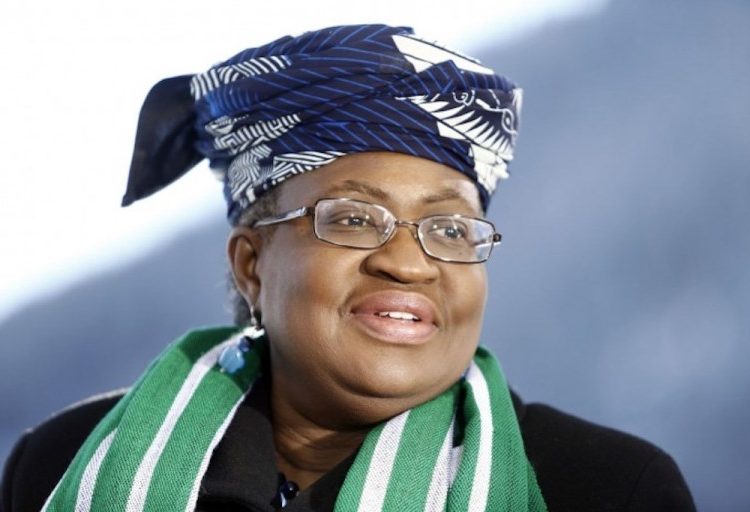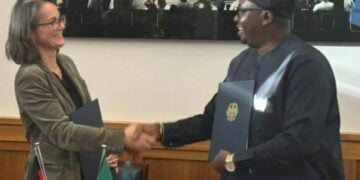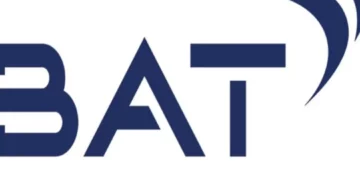With a new administration at the federal level expected to be sworn in by May 29, 2023, economy stakeholders as well as experts want the next Finance and Petroleum Ministers to be in the mould of of the former Finance Minister and current director general of World Trade Organisation(WTO), Dr. Ngozi Okonjo-Iweala and the former governor, Central Bank of Nigeria (CBN), Muhammad Sanusi II to anchor the Finance ministry and economy.
While virtually all of them declined to go into the politics of selecting the next Finance minister and Petroleum Minister, they want someone in the mold of Okonjo-Iweala and Muhammad Sanusi II, if the incoming administration at the federal level is serious about developing the economy at a faster pace.
They equally expected the next ministers to focus on subsidy removal while beaming serious attention to non-oil sectors for revenue generation.
The stakeholders, who spoke in separate interviews with LEADERSHIP, felt the current subsidy payment regime is riddled with corruption while causing the country several trillions of Naira annually, which could have been deployed to provide critical infrastructure for the country.
On his part, the chief executive of Proshare, Mr. Olufemi Awoyemi, said, the choice of the minister of finance is a critical one that would determine the trajectory of the incoming administration.
Whilst he declined on pushing out names of prospective candidates for the top job of managing the country’s finances, Awoyemi said, Nigeria has a bevy of intellectuals that could fit in the job.
Stressing that the choice of the Minister of Finance who would also serve as the coordinating minister of the economy must not be a matter of family and friends, neither should it be a job to be lobbied for.
Although many are already pushing out their names with underground meetings and lobbying, Awoyemi noted that the caliber of persons appointed as the Finance Minister as well as the governor of the Central Bank of Nigeria(CBN) will determine the credibility of the incoming government.
To him, “it is not about looking at names but what the agreed agenda of the administration is. Do they recognise the real challenges that we face as a country? The answer to this question would determine whatever choices that will be made.
“There are some critical problems that we cannot ignore anymore as a country. We have to make sure that the relationship between the CBN and the ministry of finance are improved. The kind of people that they will appoint must be people who can work together who will not have problems with ego. They need to bring the right kind of people because the minister of finance will likely be the chief coordinating minister of the economy.
“It is important that the decision about who will become the minister and the CBN governor are taken seriously as those two appointments confer instant credibility to the government and bring prospects to the economy both locally and internationally.”
To him, the country needs persons in the calibre of the previous CBN governor, Sanusi Lamido Sanusi, who has not only local but global recognition and who has the ears of the international community. The country, he said, is in need of the likes of the former minister of finance, Dr Ngozi Okonjo-Iweala.
When contacted by our correspondent on telephone at the weekend on the issue, the managing director/CEO of Financial Derivatives Co Ltd, Mr. Bismarck Rewane, declined to speak on the issue for now.
Similarly, the Professor of Law and Dean of the Faculty of Law, Adeleke University, Ede, Osun State, Professor Tayo Bello, noted that, while he wouldn’t want to go into the politics of selecting the new Finance or Petroleum Ministers, whoever that would be selected, should have the full grasp of the portfolio and the enormity of the office they are to occupy.
Bello said, the next Finance Minister should be in the mold of Mrs. Ngozi Okonjo Iweala, who understands the routines of domestic and international economic politics as well as having the working knowledge of international organisations, such as the International Monetary Fund(IMF), World Bank, among others.
According to him, “ the new Finance Minister should be versatile with the domestic and international economies, comports and understands the problems on ground and has ready-made solutions to address the economic problems to put the nation’s economy on the right track.
“To this end, such a fellow must not be a politician but a technocrat who is academically and professionally qualified, have deep knowledge of the economy and economic management as well as have knowledge on accounting and banking.”
Speaking further, he said, the next finance minister should be able to think outside the box and should be able to take drastic and bold actions such as removal of subsidy, among other sensitive policies that would be better for the economy without looking at whose ox is gored.
Urging the next finance minister to start work immediately, as the current state of the economy demands, he was specific about subsidy removal which should be done in conjunction with the next Petroleum minister, adding that, the proceed from the subsidy should be invested in infrastructure, health and education, saying, this must be done in a transparent way such that Nigerians can feel the benefits of such subsidy removal.
“For the Petroleum minister, he should not succumb to pressure, especially, from the international communities, have the acumen to implement all the policies itemized for execution, eliminate corruption in the energy sector, protects the environment by stopping illegal oil bunkering while he must privatize all the nation’s obsolete refineries for value proposition, encourages private investors to float modular refineries and facilitates exploration in states where oil is found. Similarly, the limited liability status of the Nigerian National Petroleum Corporation (NNPC) should be maintained. In the end, the process of selecting the next minister should be sincere,” he pointed out.
Moreover, the registrar/chief executive officer(CEO), the National Institute of Credit Administration (NICA), Professor Chris Onalo, while congratulating the incoming administration at the federal level, said, economy is central and that stable economy will create a good business operating environment, hence, the need to choose the next finance minister, based on competence and not political affiliation.
Onalo, who is currently in the United Kingdom(UK) to understudy its economy, noted that policies, as sensitive as they were, could make or mar a country, saying, the next finance minister should learn from the flaws of the outgoing administration and make amends.
The next administration, he said, should divert from oil-based economy to non-oil based, adding that, “oil-based just like cash based economy, has created us problems, hence, advocate for a brand new system that would de-emphasise the old system. Focus on technology, agriculture, transportation, energy and power while huge focus should be on Small and Medium Enterprises(SMEs) development as they are central to economic growth.
“The new finance minister should have a huge amount of energy to think and give attention to sectors that can bring strong resilience to our economy. Similarly, there must be a huge budgetary allocation to power and energy to compete with nations such as South Africa, Ghana, among other African countries who have stable electricity supply than Nigeria. Moreover, the current system of putting the Petroleum ministry under the presidency should stop as it has not given the country any value.”
While stating that President Muhammadu Buhari’s administration has kickstarted the process of transiting Nigeria from a cashless economy to a credit-based economy, he urged the next administration to build on the process.
Saying his institute will champion this course, working with relevant stakeholders, including the government to ensure that the economic future of Nigeria is built on credit, he urged the next Finance Minister to pay critical attention to building a credit-based economy through policies formulation and implementation. The assumption of credit, he said, allows companies to produce today on credit with the motive of paying back tomorrow, noting that, no economy, anywhere in the world, develops without credit, urging Nigeria to borrow a leaf from developed economies..
Saying the last cash scarcity and its attendant effects have only depict the flaws of a cash-based economy, hence, the need to, as a matter of urgency, embrace a credit economy, he added that, Nigeria’s cash economy is not only crushing but also flashing warning signs of meltdown, stressing that, the cash economy has marred the desperate efforts to create and generate jobs for youth group, undermining national wealth creation in diverse forms, and totally exasperated the nation’s agenda for the industrial revolution.
“The credit economy is a people-oriented system that allows access to different innovative financing opportunities needed for the economic prosperity and development of every nation.
“Nigeria can no longer wait to adopt a credit-based system of economy. The journey for this transition has commenced. The journey to a credit-based economy involves everyone; from the government at all levels, corporate organisations, and individuals in all professions and specialisations. The next finance minister must give attention to this,” he pointed out.
Meanwhile, on the next minister of petroleum, experts expect the next petroleum minister to have vast industry knowledge and experience to better manage issues in the energy sector.
The former country chairman, Society of Petroleum Engineers(SPE),Engr. Debo Fagbami, said, the new petroleum minister should have professional industry background with sound technical knowledge of the oil and gas sector.
Fagbami argued that, for the petroleum industry to progress and the nation harness the potentials of the gas sub-sector which is considered the new global energy, the new administration should not take into account political patronage where someone without technical nuances of the industry should be appointed.
He further said the new administration should do away with the president retaining the ministerial portfolio which he described as unconstitutional.
“This is an unfortunate scenario and has largely disrupted a whole lot of fiscal policy and I have not seen in the constitution where it is stated that the president should hold on to this position. I think this should be discouraged by the incoming administration so that the industry would have a clear development focus,” he said.
In her submission, country manager, Capworth Consulting and retired professional from International oil firm, ExxonMobil, Mrs. Patricia Ahonsi said, the country should now begin to consider an individual with sound background of oil politics both locally and internationally
According to Ahonsi, the industry is governed by both local and global policies and as such, a petroleum minister of Nigeria which is a major producer and a strong member of the Organisation of Petroleum Exporting Countries(OPEC), should be advanced in both regional and global politics and can predict oil market situation so as to positively reposition the industry and proactively key into global energy transition initiative.
Ahonsi was emphatic that a petroleum minister should have a track record of global oil market fundamentals and must be able to forecast price as well as advice on energy security concerns.
Above all, he said, a minister with deep industry knowledge and capable of creating product value other than relying on export should be given the portfolio.
“We need to harness the potentials of the huge gas reserves and internally create industries that will process raw materials from the industry, generate employment and turn Nigeria into a petroleum investment hub. We need an entirely new and proactive minister to drive new investment and explore our sedimentary basins with huge gas reserves,” he pointed out.
On its part, the Civil Society Legislative Advocacy Centre (CISLAC) has advised the incoming government of Nigeria to ensure the transparent and accountable implementation of strategic and sustainable developmental policies.
The executive director, CISLAC/TI-Nigeria, Auwal Ibrahim Musa Rafsanjani, said: ”we have a long way to go towards revitalizing the economy, but the incoming government needs to demonstrate the political will to at least ensure the transparent and accountable implementation of strategic and sustainable developmental policies.”
Musa (Rafsanjani), said the new petroleum minister should be proactive to ensure implementation of the Petroleum Industry Act(PIA).
He said a technocrat in such a position would restore sanity in the industry and end decades of subsidies.
According to him, “over the last decade, the country has spent over N10 trillion on fuel subsidies, about 15.5 trillion on Capital Expenditure, 2.5 trillion on Health, and about 3.9 trillion on Education. In its latest National Multidimensional Poverty Index report the National Bureau of Statistics (NBS) said that 63 per cent of Nigerians were poor due to a lack of access to health, education, living standards, employment, and security.”
“The 133 million poor Nigerians recorded by the NBS, exceeded the World Bank’s projection for Nigeria in 2022. The incoming government needs to sustain strategic policies with the potential of driving economic growth and development.” he said.
Rafsanjani expressed the believe that in light of Nigeria’s current economic setbacks, drastically declining human development indices and the emergence of an incoming government, the platform would be crucial to presenting an overview of the Nation’s economic policies under the current administration in terms of the achievement of macro-economic objectives, with a view to recommending and advancing a pro-poor economic agenda for the incoming government.
He stressed that the goal of any rational government is to improve the living conditions of her populace through appropriate and effective micro-economic policies, adding that, good policies on the other hand, should be technically sound, widely acceptable, and administratively feasible, and to achieve and sustain its macro-economic objectives.





